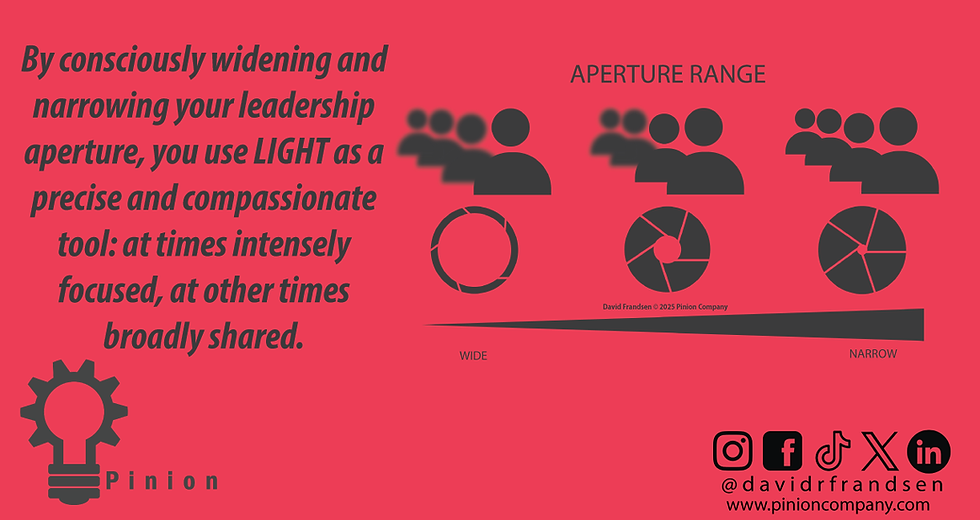Zero-Sum Thinking in the Workplace
- David Frandsen
- Oct 15
- 4 min read

I was recently talking to a friend whose son plays competitive baseball, and he shared a troubling dynamic happening within the team. Parents have grown so focused on individual performance that they rarely cheer for players other than their own child. In fact, some openly root against teammates who aren’t their own son. While it’s true that only one player can hold critical positions like catcher or shortstop, the very essence of team sports is cooperation toward a shared goal—winning the game. Yet, in today’s world, someone else’s success is too often seen as a threat or a loss.
He described this atmosphere as toxic and strange, an irony given that team sports should foster unity and support. Unfortunately, I’ve observed similar zero-sum thinking in the workplace. When a star employee receives praise, I have seen an eye roll or heard grumblings from others who feel that individual's success somehow diminishes their own standing. This mindset damages team spirit and stunts organizational growth.
So, how do we build workplaces where everyone genuinely celebrates each other’s wins? Why is shifting from zero-sum thinking critical to creating healthy, high-performing teams?
Understanding Zero-Sum Thinking in the Workplace
Zero-sum thinking is the belief that one person’s gain necessarily comes at the expense of another—as if success is a fixed pie and any increase for one means loss for the rest. This perspective fosters unhealthy competition, mistrust, and silos between employees and departments. Instead of collaborating to grow shared outcomes, people become guarded and protective over their “piece,” which ultimately limits innovation and collective success.
This mindset blocks the growth mindset—a belief that skills, intelligence, and success can be developed and expanded through effort and learning. It also undermines psychological safety, where employees feel safe to express ideas, take risks, and support one another without fear of negative consequences. Both growth mindset and psychological safety are essential foundations for high-performing, effective teams.
How Zero-Sum Thinking Shows Up
· Hoarding information: People sometimes guard knowledge like it’s currency, as if sharing will somehow make them less essential. I once worked with someone who flat-out refused to add waterline details to our maps, all because he figured that being the only one with the information meant greater job security. In reality, this mindset only slowed the whole team down and created frustration.
· Undermining colleagues: Whether it’s through subtle gossip, back-channel conversations, or outright opposition, I’ve witnessed firsthand how envy over a coworker’s achievements can trigger a quiet (or sometimes loud) campaign to undermine their success. The aim? To drag others down, often just to avoid feeling overshadowed.
· Resisting collaboration: When people hesitate to engage in joint projects or cross-department efforts, zero-sum thinking is usually lurking underneath. I remember an employee who guarded his successful methodology like a trade secret, worried that sharing his approach would erase his unique edge. But in the long run, nobody benefits when one person’s know-how stays siloed.
· Blaming others for success: This one pops up more than we realize. I’ve seen folks treat every promotion, bonus, or public recognition as a personal loss—almost as if someone else’s win had to mean their own setback. Instead of seeing achievements as proof of what’s possible for everyone, they grow resentful, casting blame and suspicion. They might say things like, “He only got that opportunity because he’s the boss’s favorite,” or assume some backroom deal led to a colleague’s advancement. This blame game not only sours the atmosphere, but it also keeps people from celebrating the team’s accomplishments or even learning from each other’s wins.
Why Organizations Struggle with It
Organizations sometimes unintentionally reinforce zero-sum thinking through well-meaning but misguided policies. Reward systems, for instance, can send the wrong message if they focus narrowly on individual performance at the expense of team achievements. We’ve always aimed to avoid this trap in our own work—recognizing that while some contributions are easily measured, others are less tangible but just as vital. Both types deserve acknowledgment, whether it’s closing a big project or quietly supporting teammates along the way.
Leaders play a pivotal role in shaping organizational mindsets. When leadership shines the spotlight only on solo accomplishments, neglects to celebrate collaboration, or communicates in ways that create rivalries between departments, zero-sum attitudes take root. It isn’t always straightforward—balancing metrics and teamwork requires awareness and intentionality. Leaders have to pay close attention to the wide range of contributions, not just the ones that show up on a spreadsheet.
Shifting Toward a Positive-Sum Mindset
Positive-sum thinking acknowledges that success and value can grow when people work together. Instead of a finite pie, it’s about making the pie bigger through innovation, teamwork, and shared goals.
To foster this mindset organizations can:
· Promote shared team goals and collective rewards that recognize collaboration.
· Encourage open communication and transparency to break down silos.
· Highlight and celebrate group achievements as well as individual excellence.
· Train leaders and employees on growth mindset principles and the power of abundance thinking.
· Create an environment of psychological safety where people feel trusted to share ideas and risks without fear.
The Benefits of Overcoming Zero-Sum Thinking
When organizations break free from zero-sum thinking, the results speak for themselves: higher engagement, more creativity, and better resilience through challenges. Teams that value collective success create environments where people are motivated to lift each other up, not just chase their own wins. It’s something I believe deeply—truly great organizations don’t worry about who gets the credit; they’re focused on shared progress. I’ve seen firsthand how a zero-sum mindset can sour a group, like my friend’s baseball team that spiraled into selfishness and resentment. But when you foster a positive-sum approach, everyone starts pulling in the same direction. The talent on the team is unlocked, trust is built, and everyone has a chance to rise together. That’s the kind of culture worth aiming for.




Comments